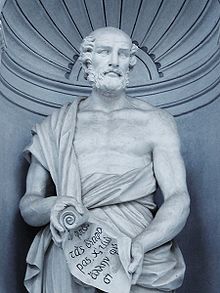Our website is made possible by displaying online advertisements to our visitors.
Please consider supporting us by disabling your ad blocker.
Theophrastus
Theophrastus | |
|---|---|
 Statue of Theophrastus, Palermo Botanical Garden | |
| Born | c. 371 BC |
| Died | c. 287 BC (aged 83 or 84) |
| Era | Ancient philosophy |
| Region | Western philosophy |
| School | Peripatetic school |
Main interests | Ethics, grammar, history, logic, metaphysics, natural history, physics, botany |
Notable ideas | |
Theophrastus (/ˌθiː.əˈfræstəs/; Ancient Greek: Θεόφραστος, romanized: Theophrastos, lit. 'godly phrased'; c. 371 – c. 287 BC) was an ancient Greek philosopher and naturalist. A native of Eresos in Lesbos, he was Aristotle's close colleague and successor as head of the Lyceum, the Peripatetic school of philosophy in Athens. Theophrastus wrote numerous treatises across all areas of philosophy, working to support, improve, expand, and develop the Aristotelian system. He made significant contributions to various fields, including ethics, metaphysics, botany, and natural history. Often considered the "father of botany" for his groundbreaking works "Enquiry into Plants" (Ancient Greek: Περὶ φυτῶν ἱστορία, romanized: Peri phytōn historia) and "On the Causes of Plants," (Ancient Greek: Περὶ αἰτιῶν φυτικῶν, romanized: Peri aitiōn phytikōn) Theophrastus established the foundations of botanical science. His given name was Tyrtamos (Ancient Greek: Τύρταμος); the nickname Theophrastus ("divine speaker") was reputedly given to him by Aristotle in recognition of his eloquent style.
He came to Athens at a young age and initially studied in Plato's school. After Plato's death, he attached himself to Aristotle who took to Theophrastus in his writings. When Aristotle fled Athens, Theophrastus took over as head of the Lyceum.[3] Theophrastus presided over the Peripatetic school for thirty-six years, during which time the school flourished greatly. He is often considered the father of botany for his works on plants.[4] After his death, the Athenians honoured him with a public funeral. His successor as head of the school was Strato of Lampsacus.
The interests of Theophrastus were wide ranging, including biology, physics, ethics and metaphysics. His two surviving botanical works, Enquiry into Plants (Historia Plantarum) and On the Causes of Plants, were an important influence on Renaissance science. There are also surviving works On Moral Characters, On Sense Perception, and On Stones, as well as fragments on Physics and Metaphysics. In philosophy, he studied grammar and language and continued Aristotle's work on logic. He also regarded space as the mere arrangement and position of bodies, time as an accident of motion, and motion as a necessary consequence of all activity.[citation needed] In ethics, he regarded happiness as depending on external influences as well as on virtue.
- ^ "History of Logic: Theophrastus of Eresus" in Encyclopædia Britannica Online.
- ^ "Ancient Logic: Forerunners of Modus Ponens and Modus Tollens". Stanford Encyclopedia of Philosophy.
- ^ Hardy, Gavin; Totelin, Laurence (2015). Ancient Botany. Routledge. p. 8.
- ^ Matthew Hall, Plants as Persons: A Philosophical Botany, p. 28.
Previous Page Next Page


